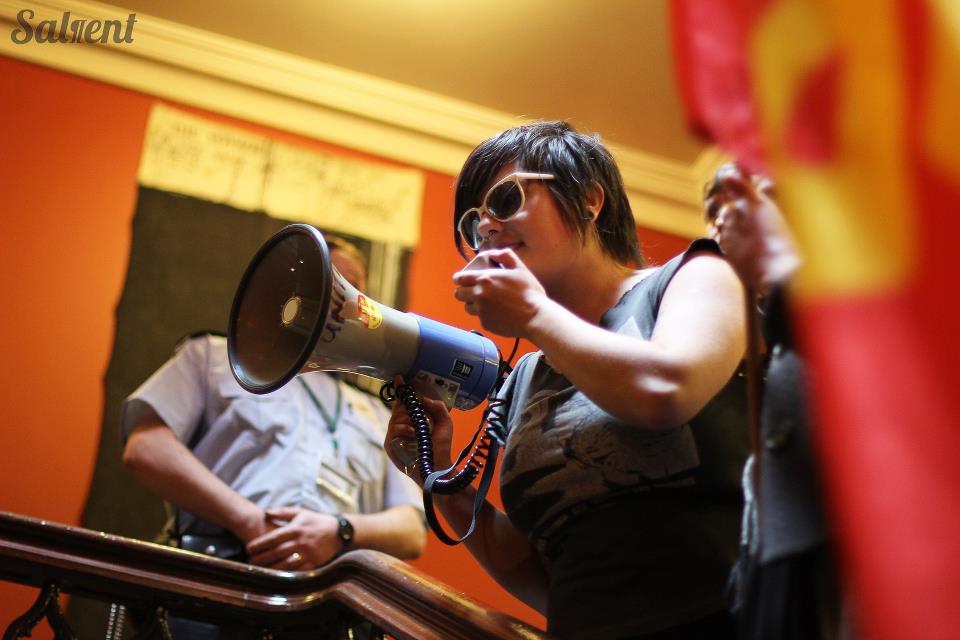Drawn from our experiences in Mana this article by Jared Phillips puts forward a socialist appraisal of the party so far. Originally published in the October issue of the Spark.
Formation of the Mana Party
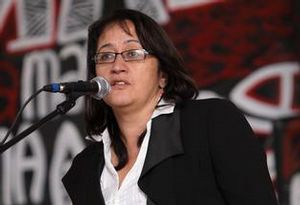 The Maori Party, after going into government with the National and Act parties fell into line and became supportive of anti-working class policies such as increasing GST (a consumer tax). As Maori Party MP for Te Tai Tokerau (the Northern-most Maori electorate) Hone Harawira opposed this and he wrote publically against the direction of the Maori Party. This is one example of how Hone stood out by not conforming to political pressure. It led to an internal dispute within the Maori Party in which Hone – in parliamentary terms – was in a minority.
The Maori Party, after going into government with the National and Act parties fell into line and became supportive of anti-working class policies such as increasing GST (a consumer tax). As Maori Party MP for Te Tai Tokerau (the Northern-most Maori electorate) Hone Harawira opposed this and he wrote publically against the direction of the Maori Party. This is one example of how Hone stood out by not conforming to political pressure. It led to an internal dispute within the Maori Party in which Hone – in parliamentary terms – was in a minority.
Essentially the Maori Party was a cross-class party, meaning it had no defined orientation to the working class and little orientation to working class or poor Maori in contrast to layers of Maori bourgeoisie. Our own socialist group was clear about this in relation to the Maori Party. However, we lacked the long-term political foresight to see that the class differences in the Maori Party would likely result in a rupture on class and social justice lines.
A further important catalyst for the formation of the Mana Party was the introduction of the Marine and Coastal (Takutai Moana) Act 2011 by the National/Act/Maori parliamentary majority. The Takutai Moana Act repealed Labour’s Foreshore and Seabed Act 2004 (F&S Act). Labour’s F&S Act had dispossessed Maori of the right to take a case regarding title over foreshore and seabed areas to the Maori Land Court, a right which had been won in a Court of Appeal case. Whilst the F&S Act brought all such areas under Crown ownership (aside from areas with private title), the Takutaimoana Act brings such areas under ‘common ownership’ meaning such areas cannot be owned. Therefore there is still no right for Maori to claim title over such areas, although there is a right to make claims for protected custody rights. Maori-led criticism of the Act is also based on the extraordinarily high threshold of proof showing customary use dating back to 1840 that is required in order to acquire protected custody under the Act. This led to a significant support and membership departure from the Maori Party to the Mana Party and to a more forceful insistence on Treaty-based rights.
Separate to the above-described process, and on a smaller scale, another process had been taking place since October 2010 involving leftists. There were some discussions amongst leftists – of both the far-left and of left-social democratic persuasion – about the idea of forming a new left party. There were media rumours about a new party being formed by Sue Bradford and Matt McCarten. The most formal of these discussions took place at a left dialogue meeting at the end of Unite Union’s first national conference in November 2011. Generally there was an apprehension about the formation of a new left party because of the low level of class struggle in New Zealand. Matt McCarten of Unite and Joe Carolan of Socialist Aotearoa were amongst the strongest in favour of proceeding with such a project.
When the contradiction between the Maori Party and Harawira came to a conclusion, many of those who had participated in the ‘new left party’ discussion, and others from active left tendencies, took an open approach to Mana and most soon decided to participate, help build, and make a contribution to shape the Mana Party. Continue reading “Election series article # 1: Mana Party pushes working class issues this election”
Pure Advantage: "When we say climate, we mean business"
[youtube http://www.youtube.com/watch?v=lM6ZigeP7OI]
Entry into the Pure Advantage “Green Growth” campaign by Climate Justice Aotearoa.
October issue of The Spark – expanded election issue
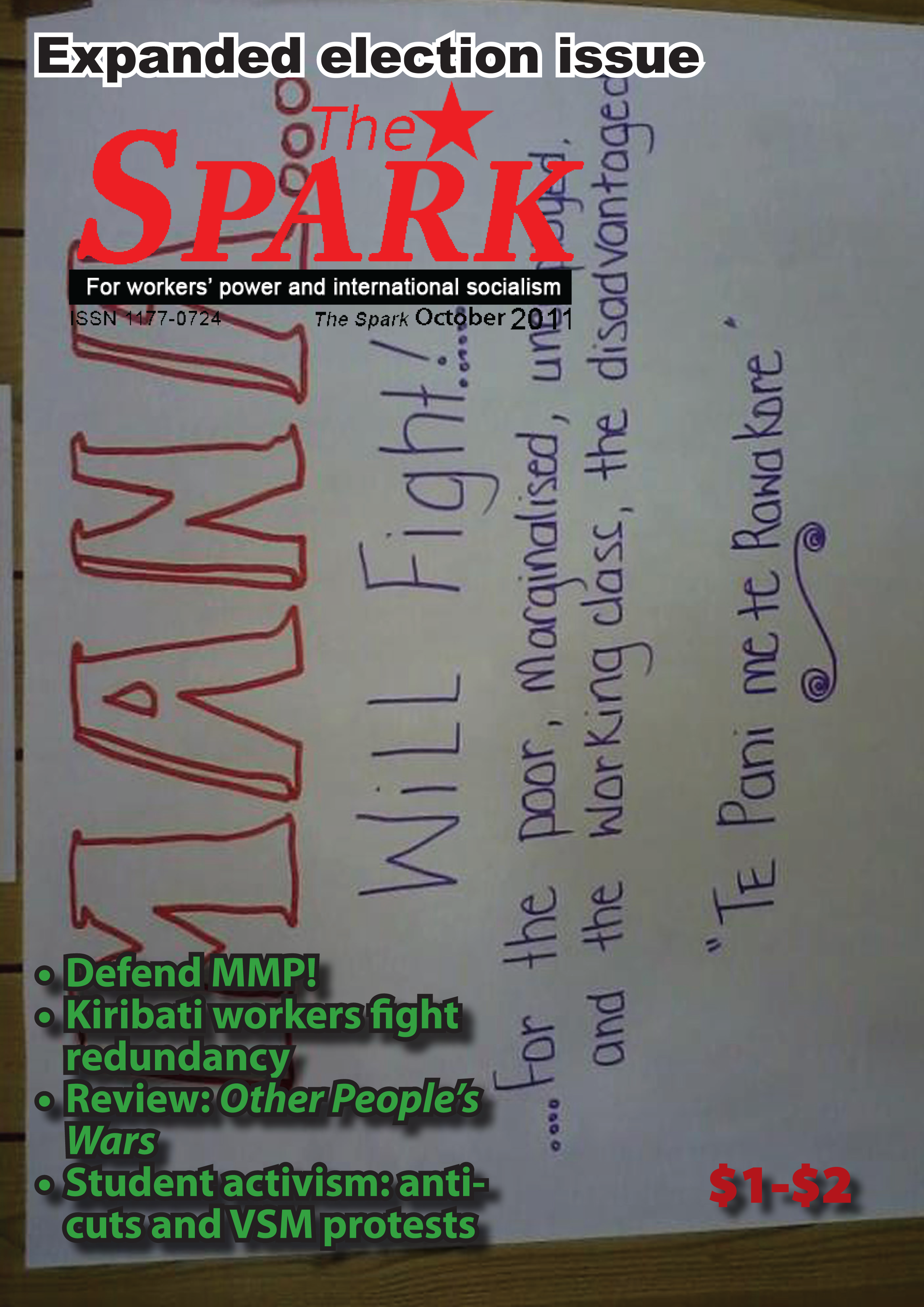 Read the October issue of The Spark here
Read the October issue of The Spark here
This month we present an expanded issue of The Spark which puts forward a socialist position on the upcoming general elections.*This starts with an assessment of the Mana Party project from a socialist point of view. In the following pages we have an assessment of other major parties which attempts to capture their current direction and articulate correct socialist strategies towards each of them. These are followed by a reprinted article from an earlier issue of The Spark which puts forward a pro-MMP position for the upcoming election. We also include material from both national days of student action against fee increases, cuts to courses, and voluntary student membership. In regards to issues of internationalism we cover some of the issues for international students, take a look at the plight of a group of fishermen who were stranded in New Zealand, and report on the struggle against redundancy by a group of Kiribati workers north of Auckland.
*The September issue of The Spark was foregone in order to prepare for this expanded issue which we will continue to circulate throughout the general elections.
Southern Paprika Limited dispute outcome
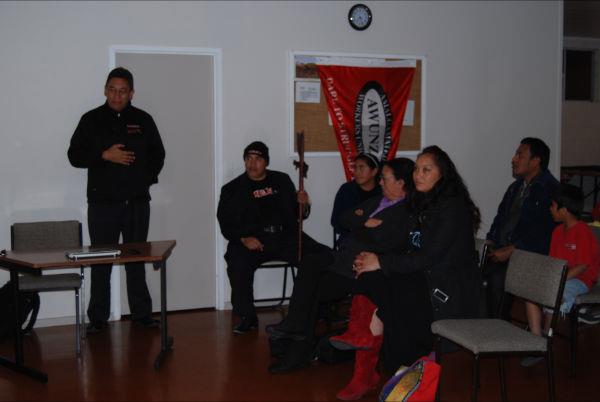
The following article updates on an earlier post on this blog in which we reprinted a September 7 press release by the Northern Amalgamated Workers Union.
On the 28th of September SPL (Warkworth) and Northern AWUNZ Union signed an agreement brokered through the Department of Labour to settle their dispute over the 13 workers made redundant on 4 October. All 13 of the workers made redundant will receive offers of permanent seasonal employment of 5-9 months per year starting on 7 November. This offer is in addition to the affected workers being given 2 weeks pay in lieu of notice, and redundancy pay of 4 weeks for the first year of service, plus 2 weeks for each subsequent year of service. The Labour Dept was satisfied that the outcome meant that the Recognised Seasonal Employer (RSE) workers were no longer displacing Permanent Resident workers.
The deal was unanimously endorsed at a meeting of the affected workers, and the union considers the outcome to be the best one achievable in the circumstances. The union understands that all of its affected members will be taking up the Company’s offer of permanent seasonal employment in November. The RSE workers will also benefit: the union was told by the company that the small increase above the minimum wage it negotiated in April will also be paid to the RSE workers who arrive next month.
The Union and the local Kiribati community had launched a lively campaign in response to the redundancies. A meeting attended by about 40 I-Kiribati workers was held in Warkworth on 14 September. Mana leader Hone Harawiri spoke, urging the workers and Kiribati community to push forward the struggle themselves. Harawira had also done a lot of work behind the scenes to get the Dept of Labour along to the meeting and getting them to force the company to participate in mediation. The star of the show was Mana activist Jesse Pene, who turned up, complete with a ceremonial fighting staff, and proceeded to give a rousing speech about how he was part of a militant struggle against redundancies by construction workers at the Aotea centre back in the day. He urged the workers to take strike action to defeat the redundancies and finished by appealing to those workers with residency to party vote Mana. His korero was greeted by rapturous applause by the I-Kiribati.
The negotiated deal represents a partial victory for the workers, considering the odds they were up against (i.e. workers from one of the poorest countries on earth versus a boss who is personal friends with John Key and Lockwood Smith). Union Organiser Mike Kyriazopoulos commented: “This proves that if you do nothing, you get nothing; but if you put up a fight – as we did – you can win something for the workers.”
'We Are The University' – A Firsthand Perspective on the Auckland University occupation
This article is written by a Workers Party sympathiser at Auckland University
Once again the mainstream media establishment have neglected to tell
all sides of a story – in this case regarding the autonomous student
action that resulted in an occupation at the University of Auckland on
the 26th of September. I feel that my own experience goes in direct
opposition with a lot of what has been said – from not only having
been at the event, but also taking a small role in its organisation.
The occupation was about far more than the Voluntary Student
Membership (VSM) bill, it was about the increasing corporatisation of
tertiary education in this country, of which VSM is but one part of a
sustained attack on tertiary education as a whole.
Other demands were against the cutting of academic work conditions,
negatively affecting quality of research, and against the continual
rise in student fees. With this in mind, the choice to occupy the Owen
G. Glenn Building was an inspired one, as to many it is a symbol of
Auckland University’s not-so-gradual transition from an educational
institute to a business.
Continue reading “'We Are The University' – A Firsthand Perspective on the Auckland University occupation”
The Queer Avengers March On
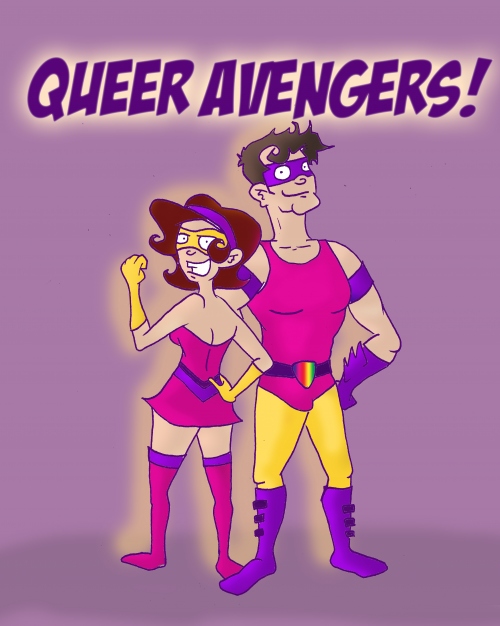 This interview with Queer Avengers spokesman and Workers Party member Jason Froch was first printed on GayNZ.
This interview with Queer Avengers spokesman and Workers Party member Jason Froch was first printed on GayNZ.
“Queer our Schools” is the first campaign to be born from Wellington-based group The Queer Avengers, which emerged from the Queer the Night march in the capital. We find out more about the group and what changes it wants in the nation’s schools.
In June a vibrant collection of people hit the headlines with a march through the Wellington streets where they made it clear they were sick of violence and abuse being hurled against gay, lesbian, trans, bisexual … (or as they prefer to simply do, drop the lists of identities and simply say “queer”) … people in the central city.
After the rousing chants and speeches the marchers have not fallen silent or just wandered back to their day to day lives, in fact a solid group has been meeting every Thursday to discuss the issues the community faces and ways to fight for change. Under the moniker The Queer Avengers they now are planning a three-pronged campaign, the first part which will focus on youth.
On 6 October a march will be held from the Ministry of Education at 45-47 Pipitea St in Thorndon, through to Midland Park on Lambton Quay, where there will be speeches and entertainment. Continue reading “The Queer Avengers March On”
Vic Students Make Some Noise
This article was originally published in the SA Anti-Capitalist Uni Special.
By Joel Cosgrove, Workers Party member and former VUWSA President.
Students at Victoria University have started to fight the cuts and redundancies that have become commonplace over the last five-seven years.
The most recent attack that started the current fightback was a change proposal put forward by the University to radically change the focus and academic content of the School of History, Philosophy, Political Science and International Relations. The past modus operandi of VUW management has been to make some sort of half-arsed pseudo-academic or financial justification of the changes management want to make. This is window-dressing at best. What it amounts to is the domination that management have over the university as a whole i.e. staff, students and the wider community. They feel that they can change the perspective and direction of the university at their whim. Previous management shut down the Russian Studies programme in the mid-90’s, using the end of the Cold War as a justification. More recent management built some big black stone steps costing over one million dollars, the Vice Chancellor responsible was fired soon afterwards, and that is the beginning and end of his grand vision of that time. So there is a long history at VUW of various dominant incarnations of senior management feeling the need to assert ‘their’ ‘vision’ and get rid of the previous ‘vision’. In effect this represents the usurpation of democratic decision-making and ownership of the university proper.
It’s this situation that has been building up over the last couple of years and exploded in anger last Wednesday. VUW management have adopted harsh tactics to repress any student organising on campus. Whether this has been trespassing key activists or threatening/intimidating students with potential punishment. It reached a crescendo with VUW security’s attempt to effectively stop the use of chalk to write political statements around the university, by washing them off with water as soon as the chalking appeared. They have done something similar to posters. Assuming that if they make it so labour intensive for students to organise and agitate, the barrier will be set too high for anything to happen. What this meant in practice, was that the level of anger and motivation just needed to rise higher before overcoming this barrier.
This threshold was reached when 56 students met in the Student Union Building in anger at the cuts going on. A protest was organised for the following fortnight. The University’s attempt at suppressed political expression was smashed by focused, constant and decentralised chalking throughout the university. By the day of the protest, VUW security had given up on trying to stop this.
There was a highly charged peaceful protest, with security hitting and attacking students. That in itself is a manifestation of the attitude by management to students. The desire has been laid down to do more than militantly witness VUW slashing and burning. Some of the key ideas coming through in Wellington, are the need to organise to fight a long-term struggle against the whims and flights of fancy of VUW Management. As well as building through practice and discussion a living, organic alternative to the authoritarian tendencies of VUW.
Voluntary Student Membership (VSM) – a socialist perspective
This article was originally printed in the Spark December 2010, at a stage when the Workers Party Wellington branch was reconsidering its involvement in Students Assocations. We reprint it now in the lead-up to the VSM bill’s passage on September the 28th and in light of increased student militancy, with significant actions in Auckland and Wellington.
Joel Cosgrove (Wellington Workers Party member and former president of Victoria University Students’ Association).
The Education (Freedom of Association) Amendment Bill is making its way through parliament to make student union membership voluntary. Most people will be totally unaware of the bill and what it means, and may be thinking, “Anyway Freedom of Association is a good thing, isn’t it?”
Background
Currently any student studying at a polytech or university is automatically a member of their student association. A student association levy is generally charged to cover student union running costs, and these range between approximately $75 and $150 per year. Students can opt out of their membership but only upon reasons of hardship or conscientious objection. With a conscientious objection opt-out they are still liable to pay their membership levy.
On-and-off, since the 1970′s, this point of compulsion has waxed and waned as a political issue. Since the 1990s the issue has generally excited the membership of the youth and student wings’ of both the ACT and National parties. National MP Tony Steel brought forward a VSM bill in 1998 that brought about a nationwide referendum in every tertiary institute on the issue of whether student associations would stay “compulsory” or go “voluntary”. The only tertiary institute that went “voluntary” was Auckland University. Many institutes (including Victoria and Otago Universities) voted over 70% to stay “compulsory”. The difference with the current law is that it offers no choice to students on the issue. Funnily enough, students as a whole have voted to remain “compulsory”. “This Bill is an ideological solution in search of a problem. It is bad policy to impose such upheaval and chaos when there are many bigger issues facing the tertiary sector and New Zealand at present,” Said David Do, 2010 Co-President of the New Zealand Union of Students’ Associations. “Generations of students have enjoyed the services and opportunities provided by associations, and this shouldn’t be taken away from future students,” says Pene Delaney the other 2010 NZUSA co-President.
While the co-Presidents are correct, the ‘end of nigh’ predictions put forward are also unlikely to come about. The reality is that the bill is being put forward as an ideological back pat to the ACT Party (whose bill this is) and a sop to the youth wing of the National Party. Compromise was apparently agreed on to make it easier to opt out politically, but fraudulence at the Whitirea Students’ Association – of more than one million dollars – scuppered any compromise and the bill is now being pushed through unchanged. Any talk though of the extinction of Student Associations is premature. Auckland University Students’ Association has been voluntary since 1999 and has survived through grants from the University and from pre-existing business e.g. catering, rental properties etc. This is the model that most Student Associations will follow. It won’t be the end of associations as entities, as they can play a role that is useful to the university in terms of mediating student anger and organising against the ongoing attacks on student conditions. The experience of AUSA (of which David Do was a past-president) is that the university can hold the threat of cuts to student association funding if the student association protests or organises in a way that annoys or threatens the institution. Continue reading “Voluntary Student Membership (VSM) – a socialist perspective”
The footage – five videos from students' national day of action
Students enter Hunter building
[youtube=http://www.youtube.com/watch?v=oDFeP51rMAU]
Up-close: Victoria University security hitting and pushing, hitting camera. Kassie Hartendorp, Workers Party branch organiser for Wellington on megaphone.
[youtube=http://www.youtube.com/watch?v=ZMb3oEM8-Jc]
Students against debt
[youtube=http://www.youtube.com/watch?v=F7NC9KVcYQs]
Vic and barricade/occupation in Auckland – TV3
Victoria University security again
[youtube=http://www.youtube.com/watch?v=jv_taIdlAMY]
For information on the day of action protests visit click here.
Fiery scenes at Victoria University as security attack students
[youtube http://www.youtube.com/watch?v=NiYbund_msA]
Over 300 students gathered today to protest ongoing cuts and redundancies at Victoria University this afternoon.
More than one hundred students marched to deliver a letter outlining their concerns to Vice Chancellor Pat Walsh. At that point University security guards blocked access to the students, whose sole intention was to deliver their letter to Walsh or a representative. Security staff proceeded to push students down stairs and punched several in the head.
“I was just trying to slip the letter under Pat’s door; security came up and started trying to push us down stairs. There were people behind us; people could have got hurt if security had actually succeeded. Because of that, they started punching me in the head. I guess they’re not fans of non-violent protests…” Says student Sam Oldham.
A number of current and former students spoke beforehand including a recent PhD graduate, as well as a number of staff. Speakers highlighted issues of course and staff cuts as well as incompetent and short-sighted management running the university into the ground. It was put forward that senior management at VUW have cultivated a culture of fear and intimidation over more than half a decade, with staff fearful of speaking for fear of repercussions.
“I am disgusted that this culture of intimidation at VUW has extended to management condoning and supporting security staff violently attacking students. If we can’t be critical of uni policies and changes, how are meant to act as the critic and conscience of society?” Says postgraduate student Amanda Thomas.
Hundreds of outlines of students were drawn in chalk to represent the death of quality tertiary education. The sheer amount of chalking stopped security from immediately washing out any slogans they disliked, something that had been going on in the preceding two weeks. Security have claimed that chalking is “banned” at VUW.
Students are organising more actions to stop VUW management further damaging the institution. “I’m disappointed in the university, it is supposed to be a critical and creative space, but when we actually use those rights, we’re literally pushed down stairs,” says student Octavia Palmer.

